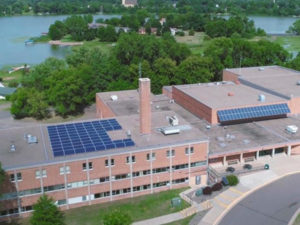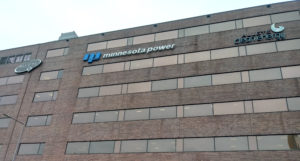Urge City Leaders to Move From Gas to Renewable Energy
According to the most recent Duluth Regional Indicators data from 2021, community emissions were estimated at 705,551 tons CO2e, or about 8.2 tons CO2e per capita, which was significantly lower than the national average of per capita emissions in 2021 of 14.24 tons CO2e. In 2021, natural gas accounted for 24% of community-scale greenhouse gas emissions in Duluth. For this reason, transitioning away from natural gas towards renewable energy sources should be an important part of our efforts to reduce greenhouse gas (GHG) emissions. A major reason why natural gas use is so high in Duluth is because many houses are heated with natural gas during the long, cold Minnesota winters because of its ability to handle peak usage.
Natural gas produces methane, which emerging studies show may negate the benefits gas has over coal or oil use. This makes the switch to renewable energy, which is the most planet-friendly source of energy, even more important. In fact, the only emissions caused by renewable energy are from transport and technology production. It may seem costly and out of reach, but transitioning to more sustainable energy sources is necessary and results in significant economic advantages. A report from the Rocky Mountain Institute estimated that savings from investing in clean energy instead of new proposed gas plants in the U.S. could amount to $29 billion in savings for consumers and avoid 100 million tons of CO2 emissions.
The City of Duluth’s own gas utility, Comfort Systems, supplies residents with natural gas. Comfort Systems has helped support some reductions in GHG emissions by offering rebates for residents looking to install more energy efficient appliances, furnaces, and water heaters, but according to Mayor Emily Larson in her 2022 State of the City speech, “We’re asking Comfort Systems to prioritize energy efficiency and find economically feasible, clean energy alternatives to natural gas.”
Comfort Systems has been focused on providing natural gas, water, and sewage and has not expressed a desire to switch to renewables. Actions they could take to move towards renewables include:
- Create an Innovation Plan to decarbonize operations in response to the Natural Gas Innovation Act (MN 216B.2427)
- Provide more robust loans and rebates to incentivize energy efficiency
- Set more ambitious energy saving goals
- Meet Conservation Improvement Program energy saving requirements
- Put more money into bill assistance and rebates for lower income customers
- Opt into R&D pilots and renewable incentive programs
- Switching fuel sources from natural gas to renewables
- Pursue funding on the state and federal level
Switching from non-renewable energy sources like natural gas to renewable energy is possible. In fact, many cities have already committed to 100% renewable energy by 2050. Duluth has now joined this list of cities and transitioning from natural gas to renewable power is an obvious way for Duluth to move faster towards this goal.
To complete this action, write to city leaders urging Comfort Systems to provide renewable options to its customers.
Resources:
Did you take this action? Report it!
Help us show our collective community impact by reporting that you took this action.




